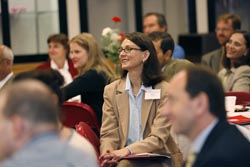|
According to university leaders, Temple's hiring boom is made possible by a complex suite of factors. Total student enrollment has surged by about 18 percent since 2000, generating more tuition revenue and a need for more professors. In addition, the retirement of a large number of faculty members hired in the late 1960s and '70s, the years following Temple's designation as a state-related institution in the Commonwealth System of Higher Education, has increased the number of faculty vacancies.
Energetic new deans also have served as catalysts. For example, Temple's College of Science and Technology (CST), led by Dean Hai-Lung Dai since last January, announced the arrival of 10 new tenured and tenure-track faculty members this fall — the largest cohort of recruits since the college's inception. The Tyler School of Art, where Dean Keith Morrison was appointed two years ago, is welcoming six new tenured and tenure-track faculty members for the second year in a row.
This year's newcomers include scholars hired from institutions such as Penn's Wharton School, the University of Washington, Tulane University, Emory University, the University of Maryland and the World Bank.
When asked what attracted them to Temple, new recruits cite a wide variety of reasons. Many, such as Professor Luis T. González del Valle, the new chair of the Department of Spanish and Portuguese in the College of Liberal Arts, were drawn by a sense of Temple's forward momentum.
"Temple is at a transitional point in its history," said González del Valle, an expert in modern Spanish and 19th century Cuban culture who had held a tenured professorship at the University of Colorado at Boulder. "New and exciting things are happening here. The idea of being at an institution that is evolving and having a small part of that process is highly desirable."
Mark Feitelson, a professor of biology hired from Thomas Jefferson University, was lured in part by opportunities for interdisciplinary research and teaching. As associate director of Temple's Center for Biotechnology, Feitelson will work on collaborative projects with faculty members and students from many of Temple's schools and colleges, including the Fox School of Business and the Beasley School of Law.
"There is a breadth and depth of disciplines here at Temple," said Feitelson, who studies how Hepatitis B and C viruses cause liver cancer. "Interdisciplinary work is an intellectually expanding experience for me and for students. I see it as an opportunity to bind together CST with resources that already exist on campus, making the whole greater than the sum of the parts."
For many new recruits, the attraction was the Temple faculty — its quality, its growth, and in the case of new Temple Law Professor William Carter, its demographics.
"The diversity of the faculty was a big part of my decision to come here," said Carter, a renowned constitutional law and civil rights scholar hired from the Case Western University School of Law. "I can't think of another faculty at a law school of this rank and size that has as many women and people of color in positions of responsibility and respect."
|
